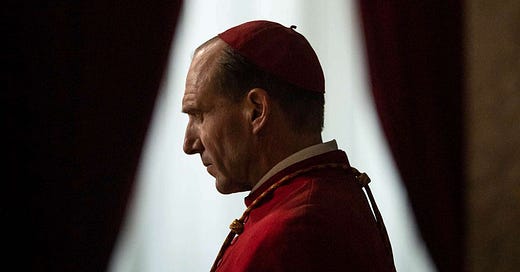Edward Berger’s film adaptation of Robert Harris' 2016 novel Conclave is a must-see, though not for the reasons you might expect. Sure, it boasts stunning visuals and an impressive cast, but it has also sparked criticism as a "woke" and even anti-Catholic portrayal of a papal conclave. Do the critics have a point? Perhaps. But before you write it off, let me offer three reasons why this movie is still worth your time.
It’s a conversation starter
Let’s face it: your non-Catholic friends have likely already seen Conclave—just like they flocked to The Two Popes a few years back. These movies leave lasting impressions, for better or worse. If you want to engage in meaningful conversations about faith, the Church, or even what Hollywood gets wrong, watching the movie gives you a leg up. Sure, critiques of the Church can sting, but being informed helps us respond thoughtfully rather than defensively. In the spirit of Saint Dominic: preach boldly, but always with an understanding of those you are speaking to.
The character studies shine
Yes, the cardinals’ scheming is predictable, over-the-top, and occasionally tiresome. But the heart of the story lies in how the characters grapple with the possibility of becoming Pope. Their fears, ambitions, and skeletons in the closet come to the surface in ways that feel deeply human. It’s a compelling reminder of the weight of leadership and the mix of grace and frailty that defines us all.
An imagined past that will no longer be our future
One of the film’s more striking (and dated) moments is how the cardinals entirely ignore the nuns who serve their meals and clean up after them. It’s a poignant visual critique of hierarchical detachment—but it also feels like a snapshot of a Church that’s fading away. Compare this to the Synod on Synodality, where laypeople, clergy, and religious shared meaningful conversations about the Church’s future. If Conclave critiques anything, it’s the ghost of a past Church, not the one we see emerging today. Whether you cheer these changes or not, the contrast is worth reflecting on.
Conclusion
In short, Conclave isn’t perfect—it’s entertainment, not a documentary. Yes, it’s occasionally “woke,” but it’s also a springboard for dialogue and introspection. As I walked home after watching it, I found myself praying with gratitude. The bleak future it imagines feels less inevitable thanks to the ongoing renewal sparked by the synodal process: Ecclesia semper reformanda. So grab some popcorn, and let the film challenge you. After all, who knows where the Spirit might lead in those post-movie conversations?
Picture credit: FilmNation Entertainment




